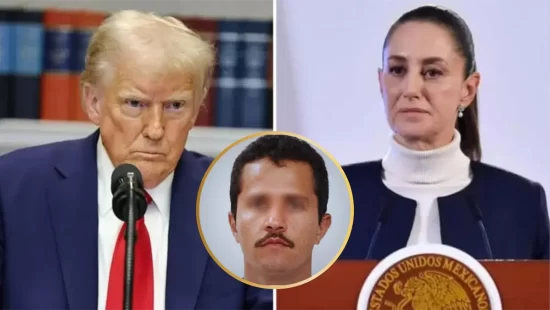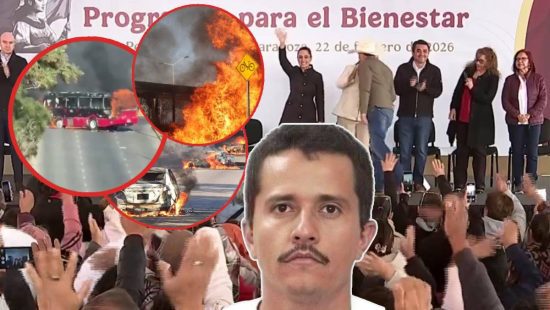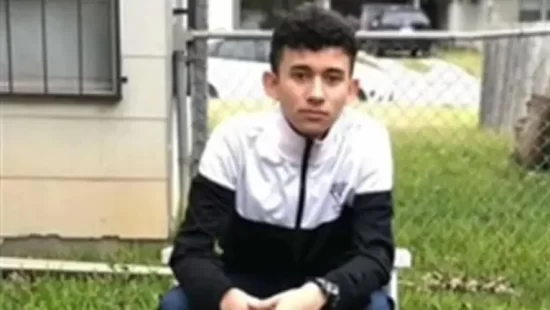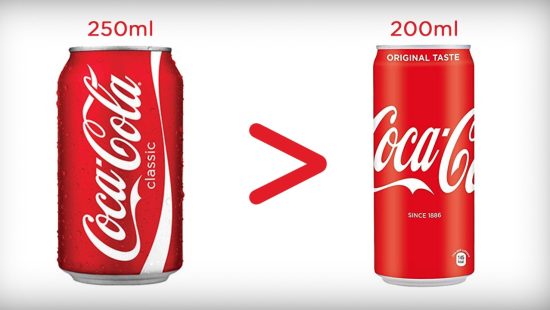Manuel Vicente and Luis Valentán in front of the microphones of Radio Jornalera.
Immigrants and workers are fighting, and amid this ongoing battle against the Trump Administration’s policies, Radio Jornalera serves as a vital medium for delivering content to the community that otherwise wouldn’t reach them.
“Traditional media outlets respond to different interests. It doesn’t matter who’s speaking or broadcasting the content. Behind them, some commitments have nothing to do with day laborers or the working class,” says Manuel Vicente, General Director and co-founder of Radio Jornalera in the U.S. and other countries.
Vicente doesn’t mince words. Like Radio Jornalera in Los Angeles, his message is clear, committed to the workers, and firmly unwilling to make concessions. Their struggle, their presence, and their content carry one commitment: the people.
“Anyone behind a microphone has a responsibility to the community, to the people. Many speak about us without knowing us.”
To him, Radio Jornalera has become the only information channel that represents workers. Being part of the National Day Laborer Organizing Network (NDLON) is a big advantage because the building from which they broadcast is visited daily by hundreds of day laborers. They are close to them and understand the issues they face — the topics that matter to them.
“Initially, we conducted a sort of study to see what the day laborers were interested in hearing. We realized most of them were only using Facebook. They weren’t listening to the radio or following other media outlets. That’s how we started defining what we would do with Radio Jornalera,” says Vicente.
The disconnect between so-called traditional media and workers negatively impacts the community. Many speak about THE COMMUNITY, but few know it or are close to it. According to Vicente, some of those outlets do touch on sensitive topics for Latinos, but they do it the wrong way.
“They instill fear. They talk about immigration and terrorize people instead of providing them with resources,” Vicente adds.
This June 1, Radio Jornalera will mark six years on air. For its director, it’s been six years of learning, understanding what works and what doesn’t, experimenting, and responding to the needs of day laborers. Feeling what they go through.
“People still have hope. That’s why we haven’t changed our tone. There needs to be a balance — not just delivering news about the chaos we’re living through, but also things that bring people some balance,” Vicente says (In the photo, Valentán conducts an interview.)
When they started in 2019, they had a traditional concept. They built an all-day programming schedule with various segments. But they faced challenges: they didn’t have a radio frequency and depended on social media and their own platform to reach workers. They first developed an app, and then adjusted the programming into segments that better reflected the interests and goals of Radio Jornalera through social media.
Regional Organizer and Communicator at Radio Jornalera Luis Valentán is a vital part of this project..
Over these six years, they have evolved into the voice of the workers. Their presence and model have been so well received that other stations — a kind of affiliate membership — have emerged, not just in the U.S. but in Central American countries as well.
Their editorial stance is simple: focus on everything related to the worker, maintain a critical perspective, and uphold their core principle: “Our commitment is to the people,” Vicente reaffirms.
“We are clear that we must stick to our truth, not that of the oligarchs. Workers — the people — know what daily life is like, how hard it is to survive one more day, to live under the harassment of institutions. And we have to talk about that, provide resources, offer options. That doesn’t fit into traditional media. It’s not their agenda — and their agenda is not our agenda,” he adds.
Luis Valentán is recognized the moment he interacts with the community. People recognize his commitment, and he recognizes their urgency.
To him, there’s a major cultural disconnect. He recognizes that day laborers hold great power — they are the engine that keeps society moving. But many don’t see that.
During the recent wildfires that struck Los Angeles, day laborers made local, national, and international headlines. Those unfamiliar with them couldn’t understand the existence of these volunteer brigades that helped with cleanup and unmet community needs.
“Yes, I know, many were surprised. That’s why I talk about this disconnect. Many so-called leaders — politicians, national and international press — came just to get the quote they wanted and left. Others just came for the photo. As we say, ‘when something is attractive, everyone wants to be associated with it,” he says.
To Vicente, it’s hypocritical that companies like Univisión aired racist DHS (Department of Homeland Security) ads, warning that immigrants would be hunted down and deported.
“These are the kinds of interests we’re talking about. We, the workers, the day laborers, are not going to be saved by politicians. We have to save ourselves. That’s why we don’t support any politician. We have friendly relations with some — but that’s it,” he adds.
Hard times are ahead, and Vicente knows it. But he also trusts the organization they’ve built and the informative work they do to equip their community with tools that can help.
“Racist politics are still out there, and in the middle of all this, there’s a void — a lot of fake news. People still have hope. That’s why we haven’t changed our tone. There needs to be a balance — not just delivering news about the chaos we’re living through, but also emotional content, entertainment, things that bring people some balance,” he says.
But it’s not just about hope. He says the community — those who have the least — have resisted 500 years of injustice. He knows we have to move forward. He knows immigrants are creative and capable of driving change without having to prove anything.
“Inhumane treatment should not exist. That’s why we say: only the people save the people,” he says.
And he ends with a piece of advice: “Anyone behind a microphone has a responsibility to the community, to the people. Many speak about us without knowing us.”
RADIO JORNALERA
https://www.facebook.com/
https://www.instagram.com/radiojornalera/








